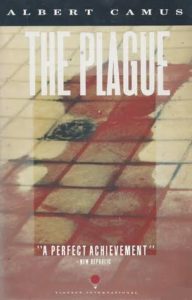With entire countries under lockdown, Albert Camus’ ‘The Plague’ provides an insight into human emotions and reactions to turmoil
In January 1941, 28-year old Albert Camus, an Algerian French philosopher and Nobel laureate, started writing about a deadly epidemic transmitted to humans through rats resulting in the death of almost half of the population of Oran city.
‘The Plague’ published in 1947 was the title he gave this novel, mirroring the current situation being witnessed across the globe. He turned a piercing gaze on life under quarantine. A strange life, devoid of socialising — contrary to what humans are used to–separated from loved ones, “A feeling normally as individual as the ache of separation from those one loves suddenly became a feeling in which all shared alike,” Camus writes.
The Covid-19 outbreak has forced many countries to announce lockdowns, forcing people to stay within the confines of their homes and leaving many stranded. Marriages, social and sporting events are being cancelled and many have been separated from their loved ones. The ongoing quarantine and social distancing is alien to our generation which has never seen it happen before.
Akash Puri and Mili Goswami, a couple, who had to convince their parents for their marriage, are stunned at the turn of events. It had taken them an entire year to convince their families for the nuptials. “Never thought anything like that would happen to us, we were planning to get married on 4 May, which is highly unlikely seeing the circumstances. I don’t know how to express it.”
Coronavirus has exposed the frailty of the human condition, which Camus addressed in his book. The isolation in the digital age recolours Camus’ portrait. In the novel initially, the citizens of Oran refuse to believe that the disease is spreading. They treat it as a “bad dream,” making vacation plans and formulating different opinions.

Sceptics contract the plague and become victims “There are no rats in the building”, insists the Dr Rieux’s concierge, who later himself dies of the plague. The newspapers kept on telling the populace that the pestilence was under control even when it was not–an eerie reflection of the misinformation and myths in circulation today.
Politicians denied it until it stared them in the face, which mirrors the initial response of some world leaders — Trump’s initial response to Covid-19 was mockingly calling it “Chinese virus”. The initial response of various other countries too could have been better.
Even here in India, the first case was identified on January 30 but it took 50 days for the government to respond to the imminent threat leading to a drastic response today– locking down 1.3, billion people (the only option at this time).
The challenges faced by the present-day populace reflects the dilemma that many countries — to protect the economy or to just save lives at the moment. India which spends just 1.28% of its budget on health has suddenly been forced to announce that the primary focus would be on healthcare services. Doctors have now become the new soldiers.
In ‘The Plague’, when the harsh reality of the disease becomes apparent, the city closes its borders to all outsiders. Churches and funerals are banned. Communication is restricted — which is not the case in today’s world, thanks to technology. But the physical restraints of the lockdown are similar.
Living in a state of crisis brings with it its perils and miseries. It gives way to black marketing and hoarding for more than just the essentials. Even in India fake sanitiser sellers are being busted, while the prices of masks skyrocket due to hoarding. Even the availability of liquor and cigarettes have seen a sharp decline, giving rise to profiteering.
The bubonic plague, also known as the Black Death killed almost a third of the people in Europe in the 14th century. Compared to that, the destruction caused by Covid-19 is still contained, but the idea of a city, a nation, a civilisation under quarantine is the same.
In the novel, Camus uses metaphors while attacking corrosive ideologies like fascism. But it is wrong to assume that Camus intended to bring up the issue of uncontrollable contagious disease as just an allegory of fascism. He was attacking the moralising principles of society.
Dr Rieux, who watches a child die, loathes the approach of attributed suffering to a punishment of God. One of the important aspects of this book is the suggestion that suffering is not a part of universal moral design. It is randomly distributed.
Another important aspect of human life is heroism, inherent in people who are decent and do their stipulated jobs. Camus writes, ‘This whole thing is not about heroism. It’s about decency. It may seem a ridiculous idea, but the only way to fight the plague is with decency.’ A character asks Rieux what decency is. Doctor Rieux’s response is as clipped as it is eloquent: ‘In general, I can’t say, but in my case I know that it consists in doing my job.’
Eventually, after a year, plague goes away, people celebrate its passing. Normalcy returns but this is not the way Camus sees it. He writes, ‘He knew that this happy crowd was unaware of something that one reads in books, which is that the plague bacillus never dies or vanishes entirely, that it remains dormant for dozens of years, that it waits patiently in bedrooms, cellars, trunks, handkerchiefs and old papers, and that the day will come when…the plague will once again rouse its rats and send them to die in some new well-contented city.’
‘The Plague’ is a must-read for those who wish to understand the ideals of heroism, compassion and strangeness of the lockdown we are experiencing.





